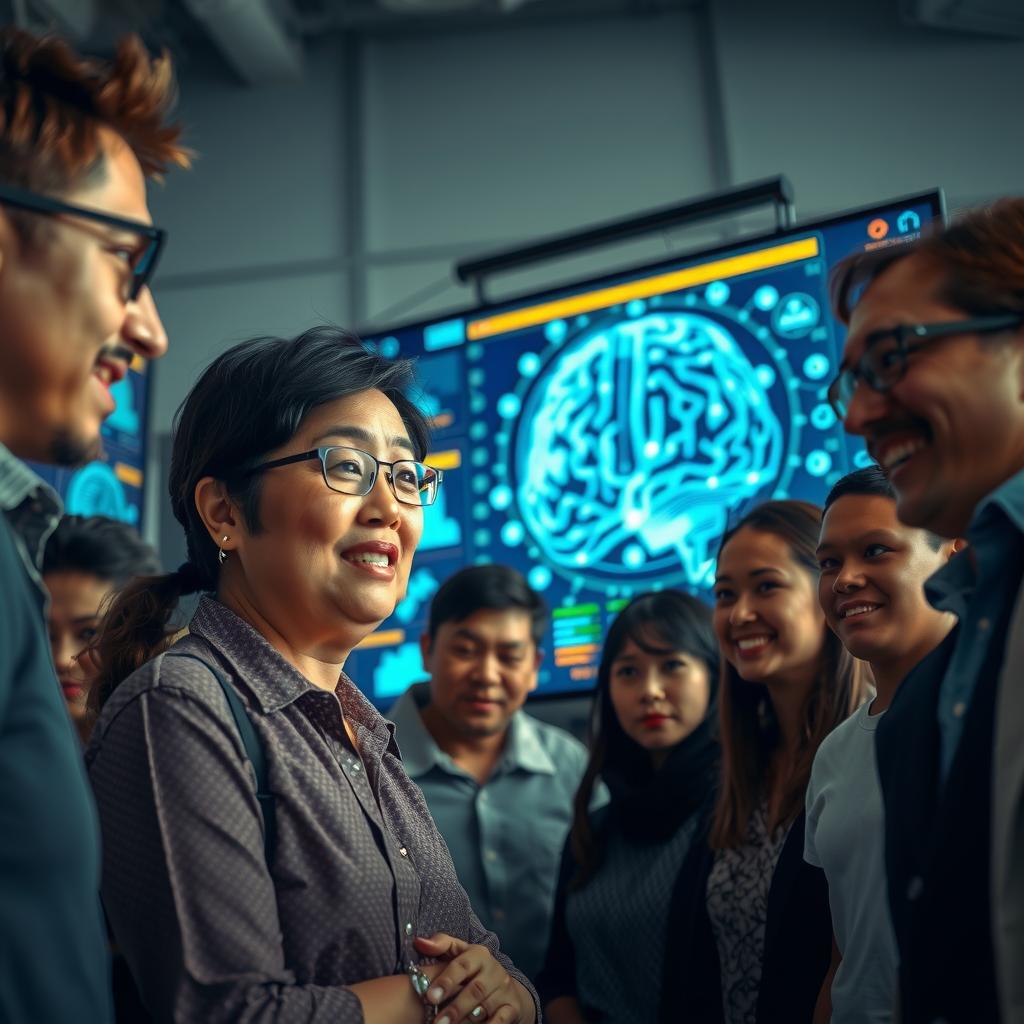Ethical AI Development: Addressing Bias and Fairness in Machine Learning Models
As the adoption of artificial intelligence (AI) and machine learning (ML) continues to grow across various industries, it has become increasingly crucial to address the issues of bias and fairness within these systems. The development of ethical AI is a complex and multifaceted challenge that requires a holistic approach. Researchers and practitioners in the field of Ethical AI development must grapple with the inherent biases that can creep into machine learning models, and strive to ensure that these systems are fair and inclusive.
One of the primary concerns in Ethical AI development is the issue of algorithmic bias. Machine learning models are often trained on datasets that may reflect societal biases, leading to the perpetuation and amplification of these biases in the model’s outputs. This can have significant consequences, particularly in high-stakes decision-making scenarios, such as criminal justice, healthcare, and finance. Fairness-Aware ML techniques, which aim to mitigate bias and improve the fairness of AI systems, have emerged as a crucial area of research in the field of Ethical AI development.
Another critical aspect of Ethical AI development is the importance of diverse and inclusive AI teams. The development of AI systems requires a deep understanding of complex social and ethical issues, which can only be achieved through the collaboration of individuals with diverse backgrounds, perspectives, and expertise. By fostering diverse AI teams, organizations can better identify and address potential biases and ethical concerns, ensuring that their AI products and services are equitable and inclusive.
Furthermore, the regulation of AI ethics and the development of robust governance frameworks are essential in ensuring the responsible and ethical development of AI. Policymakers and industry leaders must work together to establish clear guidelines and standards for AI development, ensuring that ethical principles are embedded throughout the entire lifecycle of AI systems. AI Ethics Regulation is a crucial component of Ethical AI development, providing a framework for the responsible and accountable deployment of these technologies.
As the field of Ethical AI development continues to evolve, it is essential that researchers, practitioners, and policymakers collaborate to address the complex challenges of bias and fairness in machine learning models. By embracing a multidisciplinary approach and prioritizing the development of Ethical AI, we can ensure that the benefits of these powerful technologies are realized in a way that is fair, inclusive, and aligned with our core values.

Salient Aspects:
-
Sources of Bias in AI: The article explores the various sources of bias in AI systems, including data bias, algorithmic bias, and interaction bias. These biases can lead to unfair and discriminatory outcomes, which is a critical ethical concern.
-
Types of Fairness: The article delves into the different types of fairness in machine learning models, such as individual fairness, group fairness, and equality of opportunity. Understanding these concepts is crucial for promoting fairness in AI systems.
-
Detecting and Mitigating Bias: The article discusses techniques for detecting bias in machine learning models, as well as methods for mitigating bias through preprocessing, in-processing, and post-processing approaches. Fairness-aware machine learning algorithms are also explored.
-
Trade-offs and Case Studies: The article examines the trade-offs between fairness and model performance, and provides real-world case studies of bias in AI systems. This helps illustrate the practical challenges and importance of addressing bias.
-
Regulatory and Diversity Considerations: The article delves into the legal and regulatory landscape for AI ethics, as well as the role of diverse teams in developing ethical AI systems. These aspects are crucial for the responsible development and deployment of AI.

Uncovering Bias and Promoting Fairness in AI Models: A Vital Ethical Imperative
Detecting and Addressing Algorithmic Bias
Algorithmic bias is a critical challenge in the development of Artificial Intelligence (AI) models, and it is essential to address it to ensure fairness and ethical AI practices. Detecting and mitigating bias in machine learning models is a complex task that requires a multifaceted approach.
One of the key techniques for identifying algorithmic bias is data analysis. By carefully examining the training data used to develop AI models, researchers can uncover biases that may be present in the data, such as underrepresentation of certain demographic groups or historical biases reflected in the data. This analysis can help identify the sources of bias and inform strategies for addressing them.
Another important technique is model evaluation, which involves testing the performance of AI models on diverse datasets and scenarios to assess their fairness and identify potential biases. This can include evaluating the model’s accuracy, fairness, and robustness across different subgroups or use cases. By systematically testing the model’s behavior, researchers can gain insights into the nature and extent of any biases present.
Fairness-aware machine learning (FAML) techniques are also crucial in promoting fairness in AI models. These approaches incorporate fairness considerations into the model development process, such as using debiasing algorithms, incorporating fairness constraints, or employing techniques like adversarial training to mitigate biases. By integrating fairness into the core of the model design, FAML can help ensure that AI systems make fair and unbiased decisions.
Additionally, the involvement of diverse teams in the development of AI systems is essential for promoting fairness and addressing bias. Bringing together individuals with different backgrounds, experiences, and perspectives can help identify and mitigate biases that may be overlooked by more homogeneous teams. This diversity can also foster a culture of ethical AI development, where the consideration of societal impacts and the promotion of fairness are prioritized.
Ultimately, the detection and mitigation of algorithmic bias is a critical component of ethical AI development. By employing a range of techniques, including data analysis, model evaluation, FAML, and the inclusion of diverse teams, researchers and practitioners can work towards the development of fair and unbiased AI systems that uphold the principles of Ethical AI.
Ethical AI and the Importance of Fairness
The development of Artificial Intelligence (AI) systems has brought with it an increased focus on the ethical implications of these technologies. One of the key ethical concerns surrounding AI is the issue of fairness and the potential for algorithmic bias.
Algorithmic bias can manifest in various ways, such as unfair treatment of certain demographic groups, perpetuation of historical biases, or the exclusion of marginalized communities from the benefits of AI-driven decision-making. This bias can have significant real-world consequences, ranging from employment discrimination to biased criminal justice outcomes.
To address this challenge, the concept of Ethical AI has emerged as a vital imperative. Ethical AI encompasses a holistic approach to the development and deployment of AI systems, with a focus on ensuring fairness, transparency, and accountability. At the heart of Ethical AI is the principle of fairness, which requires that AI models make decisions and provide outcomes that are unbiased and equitable for all individuals and groups.
Promoting fairness in AI models is not a simple task, as it requires a deep understanding of the complex factors that can contribute to algorithmic bias. Techniques such as data auditing, model evaluation, and fairness-aware machine learning (FAML) are essential tools in the quest for fair and unbiased AI.
Data auditing involves carefully examining the training data used to develop AI models, identifying potential biases, and taking steps to address them. Model evaluation, on the other hand, focuses on testing the performance of AI models across diverse scenarios and demographic groups, ensuring that the models do not exhibit unfair or discriminatory behavior.
FAML goes a step further by incorporating fairness considerations directly into the model development process. This can involve using debiasing algorithms, imposing fairness constraints, or employing techniques like adversarial training to mitigate biases. By integrating fairness into the core of the AI model design, FAML can help ensure that the resulting systems make fair and unbiased decisions.
Importantly, the pursuit of fairness in AI cannot be achieved in isolation. It requires the collaborative efforts of diverse teams, including experts from various backgrounds, to identify and address the multifaceted challenges of algorithmic bias. By fostering a culture of

Balancing Fairness and Model Performance
Navigating the Tradeoffs between Fairness and Accuracy
Developing machine learning models that are not only accurate but also fair and equitable is a critical challenge in the field of Ethical AI. As organizations increasingly rely on AI-driven decision-making, it is essential to ensure that these systems do not perpetuate or exacerbate societal biases and discrimination. This delicate balance between fairness and model performance is a topic of active research and debate.
Algorithmic bias, which can arise from biases in the training data or the model itself, can lead to unfair outcomes for certain demographic groups. For example, a facial recognition system that performs poorly on identifying people with darker skin tones is a prime example of algorithmic bias. Addressing such biases is crucial for building trustworthy and inclusive AI systems that serve all members of society equitably.
Fairness-Aware Machine Learning (FAML) is an emerging field that focuses on developing techniques to mitigate algorithmic bias and promote fairness in AI systems. FAML approaches may involve data augmentation, adversarial training, or the incorporation of fairness constraints into the model’s objective function. By optimizing for both accuracy and fairness, these techniques aim to strike a balance between model performance and ethical considerations.
However, achieving this balance is not a straightforward task. Oftentimes, there is a trade-off between fairness and model accuracy, where optimizing for one can come at the expense of the other. This tension can pose challenges for organizations that need to deploy high-performing AI systems while also ensuring that they are fair and unbiased.
Navigating the Ethical Landscape of AI
Beyond the technical challenges, the development of fair and ethical AI systems also requires navigating a complex ethical landscape. As AI becomes more pervasive in decision-making processes, there is growing concern about the potential for these systems to perpetuate or exacerbate existing societal biases and inequalities.
Policymakers and regulators are increasingly focused on addressing these concerns, with emerging AI ethics regulations and guidelines aimed at promoting responsible AI development and deployment. Organizations must stay informed about these evolving regulatory landscapes and ensure that their AI practices align with ethical principles such as transparency, accountability, and non-discrimination.
Achieving fairness in AI also requires the active involvement of diverse teams of stakeholders, including data scientists, ethicists, and members of impacted communities. By fostering inclusive and collaborative approaches to AI development, organizations can better identify and mitigate potential biases and ensure that their AI systems serve the needs of all individuals and groups.
In conclusion, the pursuit of fair and accurate AI systems is a complex and multifaceted challenge that requires a holistic approach. By carefully navigating the trade-offs between fairness and model performance, and by embedding ethical considerations throughout the AI development lifecycle, organizations can work towards building AI systems that are both high-performing and equitable.
The Evolving Landscape of AI Ethics
Navigating the Legal and Regulatory Framework for Ethical AI
The rapid advancements in artificial intelligence (AI) have brought about a complex web of ethical considerations that require careful navigation. As AI systems become increasingly ubiquitous in our daily lives, the need to ensure their development and deployment aligns with ethical principles has become a pressing concern. This article examines the legal and regulatory framework governing the ethical use of AI, exploring the challenges and potential solutions for ensuring responsible AI practices.
One of the key issues in the realm of Ethical AI is the problem of algorithmic bias. Machine learning algorithms, which form the backbone of many AI systems, can inadvertently perpetuate and amplify societal biases present in the data used to train them. This can lead to unfair and discriminatory outcomes, particularly in high-stakes domains such as hiring, lending, and criminal justice. Addressing algorithmic bias requires a multifaceted approach, including diversifying the teams involved in AI development, implementing fairness-aware machine learning techniques, and establishing transparent and accountable AI systems.
The legal and regulatory landscape surrounding AI ethics is rapidly evolving, with various jurisdictions developing guidelines, regulations, and legislation to govern the use of AI. In the European Union, the General Data Protection Regulation (GDPR) has already established guidelines for the ethical use of personal data, which has implications for AI-driven decision-making. Similarly, the European Commission’s proposal for a comprehensive AI Act aims to create a harmonized regulatory framework for the development and use of AI across the EU. In the United States, several states have implemented or proposed legislation targeting algorithmic bias and AI transparency, while federal agencies, such as the Federal Trade Commission and the Department of Justice, have also issued guidance on the responsible use of AI.
As the regulatory landscape continues to shift, organizations deploying AI systems must navigate a complex web of legal and ethical considerations. This requires the development of robust governance frameworks, including clear policies, procedures, and accountability measures. Additionally, the formation of diverse and interdisciplinary AI teams, incorporating experts from fields such as computer science, ethics, law, and social sciences, can help ensure that ethical considerations are embedded throughout the AI development lifecycle.
Effective AI ethics regulation will also necessitate collaboration between policymakers, industry leaders, and civil society groups. By fostering open dialogues and incorporating diverse perspectives, the development of a comprehensive and inclusive regulatory framework can be achieved. This collaborative approach can help balance the benefits of AI innovation with the imperative of safeguarding individual rights, promoting social justice, and ensuring the responsible deployment of these transformative technologies.
The Importance of Ethical AI Frameworks
As AI systems become more prevalent in our daily lives, the need for a robust ethical framework to guide their development and deployment has become increasingly crucial. Ethical AI frameworks ensure that the principles of fairness, transparency, and accountability are embedded in the design and implementation of these technologies.
One of the primary concerns in the realm of Ethical AI is the issue of algorithmic bias. Machine learning algorithms, which form the foundation of many AI systems, can perpetuate and amplify existing societal biases present in the training data. This can lead to discriminatory outcomes, particularly in high-stakes decision-making processes, such as hiring, lending, and criminal justice. Addressing algorithmic bias requires a multi-pronged approach, including diversifying the teams involved in AI development, implementing fairness-aware machine learning techniques, and establishing transparent and explainable AI systems.
Regulatory bodies around the world have recognized the importance of Ethical AI and have begun to develop guidelines and legislation to govern the use of these technologies. In the European Union, the General Data Protection Regulation (GDPR) has already established guidelines for the ethical use of personal data, which has implications for AI-driven decision-making. The European Commission has also proposed a comprehensive AI Act, aiming to create a harmonized regulatory framework for the development and use of AI across the EU.
In the United States, several states have implemented or proposed legislation targeting algorithmic bias and AI transparency, while federal agencies, such as the Federal Trade Commission and the Department of Justice, have issued guidance on the responsible use of AI. The development of these legal and regulatory frameworks is essential in ensuring that AI systems are deployed in a manner that respects individual rights, promotes social justice, and upholds the principles of fairness and accountability.
Effective AI ethics regulation will require collaboration between policymakers, industry leaders, and civil society groups. By fostering open dialogues and incorporating diverse perspectives, a comprehensive and inclusive regulatory framework can be developed. This collaborative approach can help balance the benefits of AI innovation with the imperative of safeguarding
Uncovering Bias and Promoting Fairness in AI Models: A Vital Ethical Imperative
As AI systems become increasingly prevalent in our society, it is crucial to address the ethical considerations in their development and deployment. This article will explore the sources of bias in AI systems and the techniques for promoting fairness in machine learning models.
Sources of Bias in AI
AI systems can exhibit bias due to several factors, including data bias, algorithmic bias, and interaction bias. Data bias can arise from the way the training data is collected or selected, while algorithmic bias can be introduced by the underlying algorithms used in the machine learning models. Interaction bias can occur when the AI system interacts with human users or the environment.
Types of Fairness in AI
When it comes to fairness in AI, there are several considerations, including individual fairness, group fairness, and equality of opportunity. Individual fairness ensures that the AI system treats each individual fairly, while group fairness ensures that different demographic groups are treated equally. Equality of opportunity focuses on ensuring that the AI system provides equal chances for success, regardless of an individual’s characteristics.
Detecting and Mitigating Bias in AI
Detecting bias in machine learning models is a crucial first step in promoting fairness. Various techniques, such as data auditing, model introspection, and fairness metrics, can be used to identify biases in AI systems. Once identified, bias can be mitigated through preprocessing, in-processing, or post-processing techniques, such as data cleaning, algorithmic adjustments, or output calibration.
Fairness-Aware Machine Learning Algorithms
Researchers have developed fairness-aware machine learning algorithms that explicitly incorporate fairness considerations into the model training process. These algorithms aim to optimize for both model performance and fairness, addressing the trade-offs between the two.
The Regulatory Landscape for AI Ethics
As the impact of AI systems on society becomes more evident, there is a growing need for legal and regulatory frameworks to ensure the ethical development and deployment of AI. Governments and organizations around the world are working to establish guidelines, standards, and policies to promote responsible AI practices.
The Importance of Diverse Teams in Ethical AI
Developing ethical AI systems requires diverse teams with a range of perspectives and backgrounds. Diverse teams can help identify and address potential biases and ethical concerns throughout the AI development process, ensuring that the final AI systems are fair and inclusive.
FAQs:
Q: What are the key sources of bias in AI systems?
A: The primary sources of bias in AI systems include data bias, algorithmic bias, and interaction bias. Data bias can arise from the way the training data is collected or selected, while algorithmic bias can be introduced by the underlying algorithms used in the machine learning models. Interaction bias can occur when the AI system interacts with human users or the environment.
Q: What are the different types of fairness considered in AI?
A: When it comes to fairness in AI, there are three main types of fairness: individual fairness, group fairness, and equality of opportunity. Individual fairness ensures that the AI system treats each individual fairly, while group fairness ensures that different demographic groups are treated equally. Equality of opportunity focuses on ensuring that the AI system provides equal chances for success, regardless of an individual’s characteristics.
Q: How can bias in AI systems be detected and mitigated?
A: Detecting bias in machine learning models is a crucial first step in promoting fairness. Various techniques, such as data auditing, model introspection, and fairness metrics, can be used to identify biases in AI systems. Once identified, bias can be mitigated through preprocessing, in-processing, or post-processing techniques, such as data cleaning, algorithmic adjustments, or output calibration.
Q: What is the role of diverse teams in developing ethical AI systems?
A: Developing ethical AI systems requires diverse teams with a range of perspectives and backgrounds. Diverse teams can help identify and address potential biases and ethical concerns throughout the AI development process, ensuring that the final AI systems are fair and inclusive.
Q: What is the current legal and regulatory landscape for AI ethics?
A: As the impact of AI systems on society becomes more evident, there is a growing need for legal and regulatory frameworks to ensure the ethical development and deployment of AI. Governments and organizations around the world are working to establish guidelines, standards, and policies to promote responsible AI practices.
